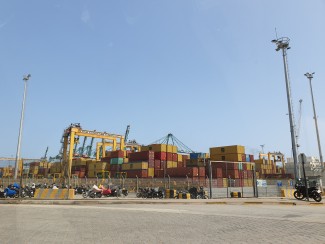Cooperative endeavor to enhance exports yields solid solutions
Nepalese farmers grow a lot of ginger.
The country produces the fourth most in the world, to be exact, and this is following its much, much larger neighbors India and China, as well as Indonesia.
When the aromatic roots are harvested from the ground, they are – naturally – covered in soil. Business as usual has farmers selling their fresh-but-dirty ginger to intermediaries who take it over the border to India, where it is washed and resold at a higher price.
But what if Nepal’s farmers washed the ginger themselves?
This seemingly simple solution to help producers garner better prices has now been put into action, in the process addressing complex issues from water access to sanitary standards to public-private partnerships.
“The washing facility is a milestone in our export development,” said Nepal Ginger Producers and Traders Association (NGPTA) secretary Hemanta Raj Bohora.
The new space in Jhapa in eastern Nepal is situated at the nation’s ginger production center, and is available to local farmers who previously didn’t have access to the amounts of water and technology required to rinse their yields or information about better agricultural practices. Now, they can clean harvests of dirt and grime, thereby readying the precious roots for export and, importantly, higher sales prices.
PRICE IS RIGHT
According to Arun GC, agriculture extension officer at the Nepal Ministry of Agriculture and Livestock Development, the facility can wash about 18 tons of ginger an hour.
Approximately 8,000 local ginger-growing households are supported by the space, and, because of its success, the NGPTA hopes to work with the government to establish such facilities in other parts of the country as well.
“We are dealing with very marginalised farmers who would not have had the means of establishing a facility like this on their own,” Bohora said.
He added, “Before the project, we were making 1-2 rupees profit per kilo selling to India. Now we are making 5-6 rupees profit per kilo.”
Ginger is a major cash crop for Nepal and an important source of income for the country’s small farmers. The washing facility and related trade support from the Food and Agriculture Organization of the United Nations (FAO), the Enhanced Integrated Framework (EIF) and the Standards and Trade Development Facility (STDF) aimed at strengthening the country’s ginger value chain and opening up new markets, thereby creating more solid ground for those whose livelihoods depend on the contemporary spice trade.
“The major achievement for us is that the producers – who are mostly poor and marginalized and female-headed households – and traders in the region have been able to access new markets. Opening up and diversifying markets is a major achievement and means new opportunities and less dependence,” said STDF Deputy Head Marlynne Hopper.
With ginger that now adheres to international standards for export, Nepal’s farmers, whose primary buyer is India, have new customers in Bangladesh, and are eyeing EU, Japanese and Middle East markets.
EIF Executive Director Ratnakar Adhikari, who recently visited the facility, said, "If only half the ginger produced in Nepal was exported through formal channels after proper washing and meeting global sanitary and phytosanitary standards, it has a potential to reduce Nepal's merchandise trade gap, meaning the import-export ratio, by at least 20 per cent."
SUSTAINABLE SPICE
“Trade depends on the seller and the buyer, and in supporting Nepal’s trade the right commodity and the right approach are also essential. We chose ginger for its export potential, and the approach we chose is a public-private partnership to benefit from what both offer and reduce any limitations,” Arun said.
“Importantly, this is offering us the potential for sustainability,” he added.
This type of cooperation is a first for Nepal, according to Bohora, and one that has already borne out additional benefits in the form of funding from Denmark to increase the Jhapa facility’s processing capacity, now double what it was initially.
As the structure was in place and the washing process already tried and tested, adding another line of equipment has been a cost-effective way to enhance impact.
“The project used a public-private partnership approach. By working closely with the private sector and with the government it really helped the small-scale producers that are involved in this sector,” Hopper said.
The NGPTA, now with offices in Kathmandu, along with the government continue to work across Nepal’s ginger value chain, creating more influence and more bargaining power along the way.
“The operation of the washing facility is with a private company but the NGPTA and government oversee its operation. And some of the profits are invested in a trust fund to help the people in that community, so we have set up a way that the facility benefits community development in the area as well,” Hopper said.
--------
Nepal Trade Integration Study (NTIS) Infographic from Enhanced Integrated Framework
If you would like to reuse any material published here, please let us know by sending an email to EIF Communications: eifcommunications@wto.org.



